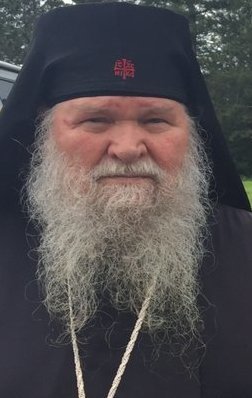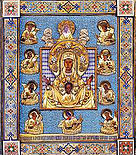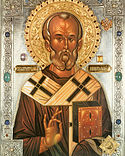INTERVIEW: Archbishop Andronik (Kotliaroff) of Syracuse and St. Nicholas. On the reasons for the break with Metropolitan Agafangel (Pashkovskiy), lies in the Church, “Cyprianism,” and his canonical status.

INTERVIEW: Archbishop Andronik (Kotliaroff) of Syracuse and St. Nicholas. On the reasons for the break with Metropolitan Agafangel (Pashkovskiy), lies in the Church, “Cyprianism,” and his canonical status.
Portal-Credo.ru: Why did you break off communion with the First Hierarch of ROCA(A) Metropolitan Agafangel and the bishops who support him?
Archbishop Andronik: The canonical basis for this break was discussed at our Sixth All-Diaspora Council in January 2017. One of the fundamental reasons is the deceit and dishonesty upon which Met. Agafangel is attempting to build church life. This is a modern version of Sergianism in which attempts are made to subordinate Christianity to anti-Christian principles. If one bases church life on deceit, then the same thing that happened to the Old Testament Church in the time of the Lord Jesus Christ will happen to today’s Church of Christ. The Lord Jesus Christ, in fact, turned to the high priests and scribes of the Old Testament Church with His terrible condemnation: “You belong to your father the devil and you willingly carry out your father’s desires. He was a murderer from the beginning and does not stand in truth, because there is no truth in him. When he tells a lie, he speaks in character, because he is a liar and the father of lies.” (John 8:44). And in the 20th century, what happened to the Old Testament Church happened to the Moscow Patriarchate. Metropolitan Sergey (Stragorodskiy) called the New Martyrs “political criminals,” turned the Church over to the administration of anti-Christian authorities, and in return received personal prosperity. We do not want the same thing to happen to our small, but faithful remnant of the Russian Church Abroad.
Portal-Credo.ru: Could you provide specific examples of actions of Met. Agafangel that you consider lies that are destroying the Church?
Archbishop Andronik: As a result of the actions of Met. Agafangel, in my diocese alone, which had consisted of 12 parishes, only six parishes remain! Those that departed were frightened by Met. Agafangel’s decree denying the sacraments, even on one’s deathbed, to those who do not agree with his actions. A few years ago, he issued such a decree against the nun Xenia and two other nuns who simply moved from a monastery near Odessa to a monastery in the St. Petersburg diocese. In another case, Met. Agafangel, directly from the pulpit during the Liturgy, began to threaten our congregation with hellfire if they did not donate towards the purchase of the Synodal House in the New York area. It should be said, that our parishioners always donated not inconsiderable sums of money to the Church and personally to Met. Agafangel. But at some point, his desire to “squeeze” everything out of our parishioners in America took on completely indecent forms. As a result, he has been left with nothing, and no one in the U.S. and Canada followed him, with the exception of two parishes, one in Washington, D.C. and another in Pennsylvania.
I want to offer two examples of lies that are unacceptable in the Church. We have a large parish, the Holy Trinity Church in the New York neighborhood of Astoria. When its esteemed long-time rector Fr. Wsewolod Dutikow died, Met. Agafangel began a real battle for this church. At the request of the parish council, I ordained to the priesthood Fr. Dimitry Dobronravov, who had served as deacon with Fr. Wsewolod, and who was well known to the parishioners. But Met. Agafangel appointed as rector Fr. Vladimir Petrenko, who lives in Brazil! The parishioners were unable to pay for his move and in general to financially support two priests. At the same time, just half an hour from Astoria, Protopriest Gregory Kotlaroff serves and lives. If one needed an experienced priest to tutor Fr. Dimitry, why not invite Fr. Gregory? The Astoria parish council permitted Fr. Wsewolod’s widow, Irina Dutikow, to live in the parish house completely free of charge for one year and only at the cost of utilities for a second year. Met. Agafangel, however, for some reason accused the council of cruelty and that they were supposedly attempting to “kick out” the matushka. This was the conflict that led to the separation of the Astoria church from Met. Agafangel.
I can offer another more recent example. In the beginning of September, I visited the Romanian Monastery of St. Minas where I communed at the Liturgy with Fr. Barnabas who is under the Romanian Old Calendar Bishop Sofrony. The next day I went to the monastery of Bishop Sofrony, where I met Bishop Anfim of Moldova who has remained with Met. Agafangel. He invited me to rejoin Met. Agafangel, but I replied: “That train has already left the station.” (At one time, the Greek Metropolitan Demetrius also tried to reconcile us with Met. Agafangel, proposing that Met. Agafangel offer us autonomy within the framework of the ROCA(A). But Met. Agafangel for some reason did not want this and forced a schism, imposing his personal will in all matters and not taking into account neither reality nor the desire of the parishes.) Soon after my meeting In Romania with Bishop Anfim, there appeared on Met. Agafangel’s “Internet Sobor” website a false account attributing to me the words that we and Met. Agafangel have “different gods.” In the comments section of this article, Met. Agafangel immediately inflated this and accused me of heresy and blasphemy. But I never said these words at all and I do not think that Met. Agafangel and we revere “different gods.”
Portal-Credo.ru: But this is all, so to speak, the moral side of the matter. Did you have any canonical or even theological reasons for separating from Met. Agafangel?
Archbishop Andronik: Of course! Although we recognized Met. Agafangel as the First Hierarch of our Church, each bishop within his own diocese possesses the fullness of canonical authority. The First Hierarch has no right to interfere in the dioceses of other bishops or to “remove the prohibitions” of clergymen forbidden from serving by their bishops. Our First Hierarch is not the Pope of Rome! Met. Agafangel encroached into the St. Petersburg diocese of Archbishop Sofroniy, and without the consent of the diocesan bishop, “took under his omophorion” the parish in the village of Dudachkino and “lifted the prohibition from serving” from the priest Aleksandr Sukhov.
Met. Agafangel usurped the authority of the Synod by making decisions without our consent. For example, on his own authority he accepted Bishop Anastasiy (Surzhik) from ROCOR(V-V). Then when asked at the Council of Bishops why he did this, Met. Agafangel answered: “Well, Bishop Anastasiy was passing by and I did not want to miss him.” And this contradicts the 34th Apostolic Canon, which forbids the First Hierarch from deciding anything without the participation of the other bishops in a Church. The Synod, which is in Met. Agafangel’s “pocket,” at his behest as chairman, began to impose “reprimands” on bishops, but according to church canons it is not right to simply judge a bishop in this fashion, this is in fact a complicated procedure. For example, when we met with the Greek Metropolitan Demetrius last year, Met. Agafangel on his own authority canceled the decision of the Synod “stripping me of my diocesan see” and restored my rights as a ruling bishop, again without a decision by the Synod. When I refused to accept this decree without confirmation from his Synod, he immediately issued a new decree returning matters to their earlier state, i.e. that I was again “stripped of my diocesan see.” He wants to manage the bishops as if they were parish priests, whom he can appoint and dismiss when and however he wants.
The actions of Met. Agafangel are permeated with an unchurchly spirit, an ignorance of the canons and of the traditions of Orthodoxy, and this turned our Church into a laughingstock in front of the other ROCA “fragments” and the entire Orthodox world.
At this point it is appropriate to also speak about the theological reasons for the separation. Unfortunately, Met. Agafangel has a superficial grasp of Orthodoxy. He was not raised in the Orthodox faith, he does not have a theological education, and he is not sufficiently well read. He was hastily consecrated a bishop in Suzdal in 1994 when an independent church authority was being established in Russia. According to the canons and given Met. Agafangel’s past life, he perhaps should not have become a bishop at all. He has subsequently preached teachings that are far from Orthodoxy. For example, he personally told me during one meal that Jews who did not accept Christ would be saved because they are “God’s chosen people.” In one of his articles in the “Vestnik TOC” (1994, No. 2, p. 30), Met. Agafangel preached the bizarre teaching that Catholics, Old Believers, Monophysites and some Protestants have six of the seven sacraments, lacking only the sacrament of the Eucharist. In an interview with “Portal-Credo.ru” in 2010, Met. Agafangel argued that the controversial theses of the Greek Met. Cyprian (Koutsoumbas) were “sound, Orthodox, ecclesiastical doctrine.”
Portal-Credo.ru: By the way, as you have already mentioned Met. Cyprian’s theses, known in some quarters as “the heresy of Cyprianism,” why do you not consider them to be heresy?
Archbishop Andronik: The reason is because Met. Cyprian himself published these theses only as a personal opinion, as issues for discussion; he did not insist that they be required for the Church. We did not share this personal opinion of Met. Cyprian. His Synod of Resistance perhaps sympathized with Met. Cyprian’s views, but they never proclaimed them as a confession of their faith. After the death of Met. Cyprian, as you know, the full complement of his Synod entered into the True Orthodox Church of Greece (the “Chrysostomites” as they are called), whose Orthodoxy is beyond doubt. Thus, we believe that with the death of Met. Cyprian, “Cyprianism” has ceased to exist in the Greek Church. In addition, we believe that the anathema against Ecumenism proclaimed by the Church Abroad in 1983 is fully sufficient to condemn the doctrine that the Orthodox Church combines heretics and Orthodox. Why condemn this as some kind of new heresy? But if Met. Agafangel proclaims Cyprianism as “an Orthodox dogma,” then this is a sign of serious spiritual error.
Met. Agafangel has now tried to accuse us in some sort of “schismo-ecumenism,” by which he claims that we recognize the different ROCA “fragments” and seek to unite with them. But it was Met. Agafangel himself, after all, who appealed to the same “fragments” with a proposal to join in Eucharistic Communion on an equal footing without joining his Synod. Our consideration of this issue is in the spirit of the famous Decree No. 362 of St. Patriarch Tikhon. As a result of the persecution of our Church, an administrative center has been liquidated – a Local Council cannot be called, the Holy Patriarch, the Holy Synod and the Supreme Church Authority have not been elected. This means that all of our Synods, church districts and all other associations of bishops are only temporary, created for the benefit of the church under different historical and geographical imperatives. None of the structures has the right to subordinate the others to itself and to declare itself the sole Supreme Church Authority. At the Sixth All-Diaspora Council, we stated that any “fragment” of the Russian Church, if it professes an intact Orthodox faith and whose hierarchy has Apostolic succession, can enter into Eucharistic communion with us, without subordinating itself and preserving its internal structure as it has historically developed. In America, Bishop Stefan (Sabelnik) responded to our proposal and joined us in Eucharistic Communion, but he is not administratively subordinate to us. For Met. Agafangel, who wants to “lord over those entrusted to you” (1 Peter 5:3), our apostolic freedom seems to be “schismo-ecumenism.”
Several years ago, Met. Agafangel consecrated Bishop Roman for ministry in Israel on the territory of the Jerusalem Patriarchate. It was done allegedly with the consent of the “imprisoned” Patriarch Irenaeus, who had hardly considered this matter. Subsequently Irenaeus subordinated himself to the new Patriarch of Jerusalem, Theophilos, and so now what is the status of Bishop Roman who remains in Met. Agafangel’s Synod? Has Met. Agafangel now encroached on the territory of another local church? I served for 25 years in the Russian Ecclesiastical Mission in Jerusalem and I well know the rules and customs that have arisen there. Even in the times of the Russian Empire there has never been a Russian bishop in the Holy Land. We observed the status quo and recognized the Jerusalem Patriarchate. As a result, the chiefs of our mission held the rank of archimandrite and not of bishop. Even the future First Hierarch of the ROCOR, Met. Anastasiy, when he lived in the Holy Land, was a retired bishop not a ruling one.
Met. Agafangel also wrote a denunciation to the Kazakh authorities, requesting that they rescind the registration of a parish in Kazakhstan belonging to Bishop Iriney after he left the Odessa Synod. This is reminiscent of what the Soviet Met. Sergey (Stragorodskiy) did in his day.
Another violation by Met. Agafangel was the consecration of a bishop in Australia. We have one parish in Australia near Melbourne and I was temporarily in charge of the diocese. A conflict arose between the parish and the rector, Fr. John (Smelic), who then abandoned the parish and ceased performing religious services. I had to send Fr. Nikita Grigoriev from America to assist the parish. Yet, despite the protests of the parishioners, Met. Agafangel consecrated this John to the episcopate, and his entire diocese consists of one nun. That Met. Agafangel ordained priests without serving the Liturgy and tonsured married priests in order to consecrate them to the episcopate, was spoken of many times at Council meetings.
At the Council of Bishops meeting in 2015, Met. Agafangel adopted a very strange resolution that contradicted the canons. He assigned to himself the management of all U.S. parishes during his visits to the United States. He usually spends only two weeks a year in the United States, and the remainder of the time, the “full authority” for administering these parishes, as stated in the resolution, belongs to me. If “controversial issues” arise, they must be resolved by Met. Agafangel alone. Thus, in effect, he appointed two bishops for the same see, which is strictly prohibited by Church canons.
The 8th Canon of the Third Ecumenical Council seems to warn Met. Agafangel:
“…or the vanities of worldly honor be brought in under pretext of sacred office; or we lose, without knowing it, little by little, the liberty which Our Lord Jesus Christ, the Deliverer of all men, hath given us by his own Blood.”
Portal-Credo.ru: How can one canonically define your separation from Agafangel? Is this a division within one jurisdiction or did you create another ROCA “fragment”?
Archbishop Andronik: We have withdrawn from administrative and canonical subordination to the Synod in Odessa and have registered in America under the ROCA name. We do not have anything in common with Met. Agafangel. We are now in the organizational stage of creating independent Church Districts. With God’s help, we have established the Diaspora District and a Russian District is being organized. My role in all of this is modest – I am not the First Hierarch but only the chairman of the Council of Bishops of the Diaspora District.
Interviewed by Aleksandr Soldatov

